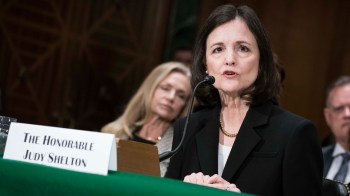David Brancaccio: Here’s a fresh political index this morning: advertising dollars spent by Republican presidential candidates per delegate this primary season. The winner of that derby so far: Ron Paul, $129,000 in ads per delegate won, according to the AP. Mitt Romney: about $91,000 per delegate to the party convention.
Democrats and Republicans running for resident are acknowledging that a key to winning in November is appealing to women voters. Nancy Duff Campbell is a founder and co-president of the National Women’s Law Center. She joins us now from Washington. Hello, Ms. Campbell.
Nancy Duff Campbell: Hello.
Brancaccio: So both Mitt Romney and Barack Obama say they’re going to pay attention to women voters in this election. Now there has been a lot of focus, of course, on the contraception issue, but I wanted to ask you: What are the economic issues that might stand the chance of winning the support of women voters?
Campbell: I think economic issues are very important to women particularly. What a lot of people don’t know is that although men lost more jobs during the recession, since the recovery started in June of 2009, women actually lost jobs during the recovery period. And they’ve only begun to get a net gain in jobs in the last couple of months. So it’s very important to women to hear about what the candidates think about how we keep this recovery going, how we make sure there are jobs for women that pay well and how we make sure that there are supports for working women like child care.
Brancaccio: Economic troubles back in ’08 — you remember the dark days of ’08? — they helped President Obama win the support of many women on Election Day. In fact, you could say women were one of the keys to his win. You think that could happen this time around again?
Campbell: I think all the candidates have to talk about women’s issues very broadly. Just as another example, as men lost jobs, of course, women in families’ income became much more important — yet we still have a big pay gap between men and women. As I said before, child care is obviously a big issue for working women. We at the National Women’s Law Center did a report last year that showed that in 37 states, women were worse off than they had been the year before in terms of child care assistance because of cuts at the state level. So what have the candidates proposed to do about that? I think — we’re a non-partisan organization, obviously — but as women, we want to hear from all the candidates on these issues.
Brancaccio: Nancy Duff Campbell, National Women’s Law Center. Thank you very much.
Campbell: Thank you David.
There’s a lot happening in the world. Through it all, Marketplace is here for you.
You rely on Marketplace to break down the world’s events and tell you how it affects you in a fact-based, approachable way. We rely on your financial support to keep making that possible.
Your donation today powers the independent journalism that you rely on. For just $5/month, you can help sustain Marketplace so we can keep reporting on the things that matter to you.


















